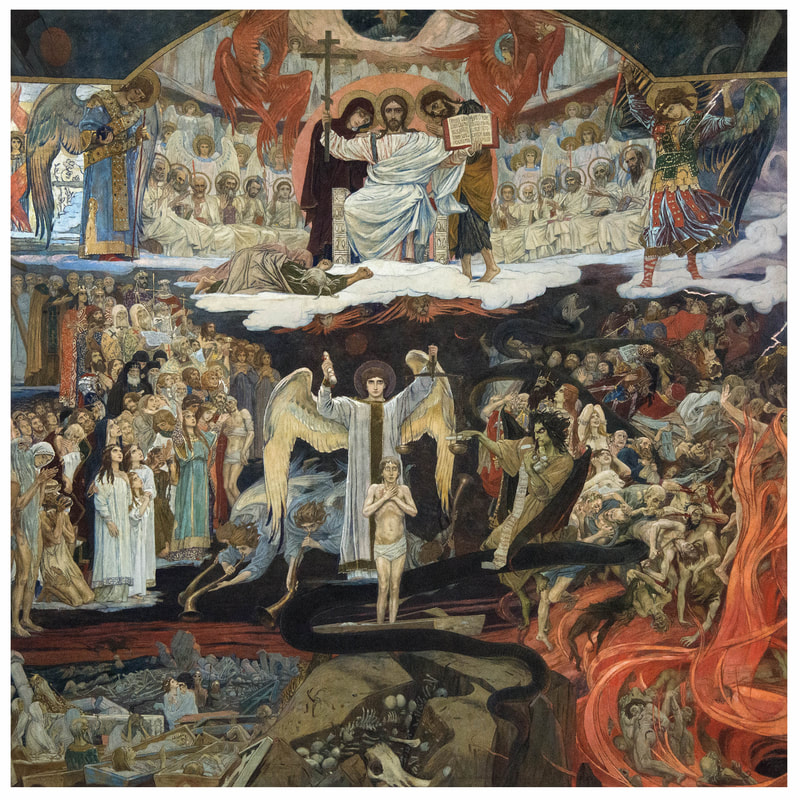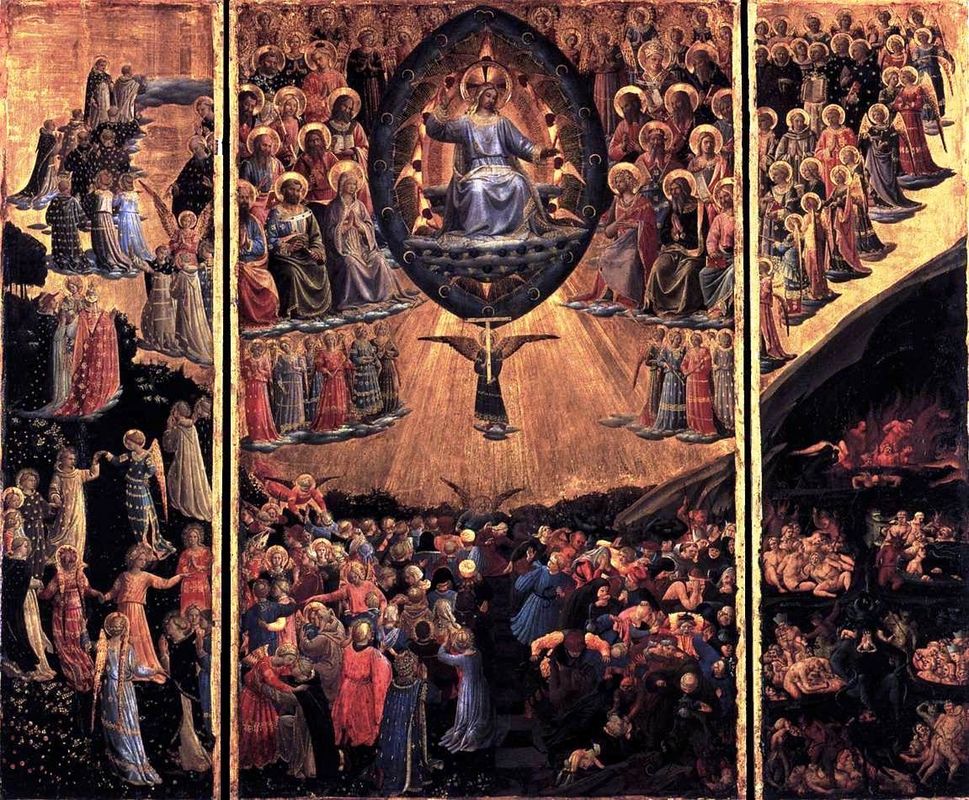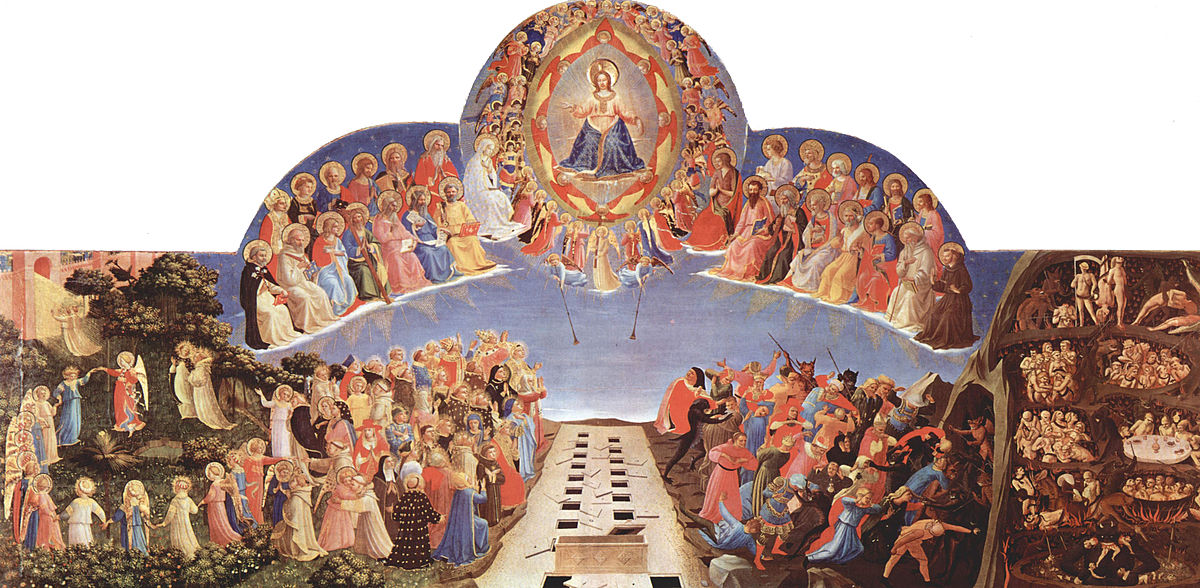Matthew 25:31-46
Pastor James Preus
November 19, 2023
“And He will come again with glory to judge both the living and the dead, whose kingdom will have no end.” This is what we confess every Sunday in the Nicene Creed. Jesus indeed is coming. Don’t mistake His delay as slowness. Rather, He is patient for the sake of His elect. And His judgment over all peoples will be final. Many will enter into eternal life, while the rest will enter into eternal punishment. But how will this final judgment play out? On what basis will some enter eternal life and others eternal hell? In our Gospel lesson, Jesus gives us the most detailed picture of Judgment Day in all of Scripture. Yet, many use this text to claim that salvation will ultimately be by works. But from this lesson alone, it is clear, that salvation is by grace alone.
First, Jesus says that the King will say to those on His right, “Come, you who are blessed by my Father...” But how does Scripture say that one is blessed by God? It is always by grace! St. Paul writes in Romans 4, “Just as David also speaks of the blessing of the one to whom God counts righteousness apart from works: ‘Blessed are those whose lawless deeds are forgiven, and whose sins are covered; blessed is the man against whom the Lord will not count his sin.’” So, it is clear that these blessed are righteous through faith. Their sins have been forgiven by God for Christ’s sake. Next, He says, “Inherit the kingdom...” Does one inherit on the basis of works or on the basis of grace? Is not an inheritance a gift? It is by definition a gift. Again, St. Paul writes in Romans 4, “Now to the one who works, his wages are not counted as a gift but as his due. And to the one who does not work but believes in Him who justifies the ungodly, his faith is counted as righteousness.”
Finally, the King says, “Inherit the kingdom prepared for you from the foundation of the world.” Before any of these righteous were born, before the earth was even created, God prepared this kingdom for them. This means that from the foundation of the world, God chose them to inherit this kingdom. This automatically excludes any of their works; it is purely by grace. St. Paul writes in Ephesians 1, “Blessed be the God and Father of our Lord Jesus Christ, who has blessed us in Christ with every spiritual blessing in the heavenly places, even as He chose us in Him before the foundation of the world … In love He predestined us...” So, those who are blessed by God were predestined by God before the foundation of the world. Yet, this predestination does not apply to the damned. Hell was not prepared for them from the foundation of the world, but rather Jesus says that it was “prepared for the devil and his angels.” God does not predestine anyone for hell. God desires to save all people (1 Timothy 2:4). Those who are condemned curse themselves by their own unbelief and go to hell for their own sins.
It is important that we maintain that those who are saved are saved by grace alone through faith in Christ alone for two reasons. First, because if salvation is even partly based on our works, we have no certainty of salvation. Imagine you are standing before God’s judgment throne. Can you think of a few reasons based on your own life for why God should condemn you to hell? I certainly can! Yet, if my salvation depends solely on Christ, then I can find no reason for God to condemn me. Christ is perfect. He has not failed in any way, but has completely fulfilled God’s Law and paid the debt of my sins in full on the cross. Second, because salvation by works robs Christ of His rightful glory by making Him share credit for our salvation with our works. This is idolatry, which God will not tolerate.
So, it is clear even by this lesson that we are saved by grace apart from our works, yet we cannot get over the fact that the main topic of this Gospel lesson is good works! Why does Jesus focus so much on good works on Judgment Day, if our justification is by grace? St. Paul explains it in Ephesians 2, “For by grace you have been saved through faith. And this is not your own doing; it is the gift of God, not a result of works, so that no one may boast. For we are His workmanship, created in Christ Jesus for good works, which God prepared beforehand, that we should walk in them.” Just as God predestined us to have faith in Christ from before the foundation of the world, so He also predestined good works for us to walk in! The good works we do through faith were prepared for us from the foundation of the world. We do these good works by grace, meaning, we do them through the power of the Holy Spirit, who dwells in us through faith in Christ. Whenever Christians do anything good or praiseworthy, it is customary for them to say, “To God alone be glory!” Christians say this, because we can do no good thing apart from Christ (John 15:5)! God gets all the glory for our good works. And this is why Jesus will praise these good works on Judgement Day, because they give glory to God and extol the only faith, which saves.
So, what do these particular good works teach us about the Christian faith and life? First, they teaches us that Jesus identifies Himself with His Christians, so that whatever you do for one of His Christians, you do for Him. Jesus identifies Himself with His ministers. Jesus said to His disciples when He sent them out to preach, “Whoever receives you receives me, and whoever receives me receives him who sent me.” (Matthew 10:40). For this reason, St. Paul instructs us, “Let the one who is taught the word share all good things with the one who teaches.” When Christians support the preaching of the Word and missions, they are supporting Christ Himself. And although these works are quickly forgotten by the world, Christ remembers them. Every cup of cold water offered to one of His preachers, Christ remembers with gratitude (Matthew 10:42).
Christ identifies Himself with little children who believe in Him. Christ said in Matthew 18, ““Whoever receives one such child in my name receives me.” So, Christian parents, never think that your labor for your children is in vain. God remembers every diaper you change, the hours you stay up at night with a crying child, the meals you prepare and then clean, and the owies you kiss. This is why Christian parents should recognize that their greatest duty is to teach their children the Gospel of Jesus Christ, bringing them to church on Sunday and teaching them the faith at home, including how to pray. Jesus identifies Himself with your children who trust in Him. And He will not forget the love you show Him through them.
Jesus identifies Himself with all His Christians. In Acts chapter 9, Saul, later known as St. Paul, was still breathing threats and murder against the disciples of Jesus, as he traveled to Damascus with papers to arrest any Christians he found, to bring them bound to Jerusalem. Christ Jesus met Saul on the way and said, “Saul, Saul, why are you persecuting Me?” Saul asked who He was, and Jesus said, “I am Jesus, whom you are persecuting.” Saul persecuted Jesus by persecuting His Christians. So, Jesus recognizes the abuse against His Christians as abuse against Himself, and He recognizes kindness done to His Christians as kindness done to Himself.
Therefore, we should be diligent to show love to our fellow Christians as we should be diligent to show love to Christ! If we do not, then we should examine whether we have true faith in Christ, which is never dead, but produces the fruits God prepared for it to produce. St. John admonishes us in His first letter, “But if anyone has the world's goods and sees his brother in need, yet closes his heart against him, how does God's love abide in him?” (1 John 3:17) and St. Paul writes, “So then, as we have opportunity, let us do good to everyone, and especially to those who are of the household of faith.” (Galatians 6:10)
So, how can we do these works, which Christ finds so praiseworthy? First, we must make use of the means of grace, meaning, we should regularly hear the preaching of God’s Word and receive the Sacrament. This is not only how we receive and sustain our faith in Christ, but it also gives us the most obvious opportunities to show love to Christ’s Christians! How do you receive Christ’s minister and show love to him if you do not receive his preaching and teaching? The Apostle exhorts us in Hebrews 10 not to neglect gathering for church, so that we may encourage our fellow Christians! It is gathered around the means of grace, where Christ forgives and strengthens His Christians through the Word and Sacraments, where Christians are given the greatest opportunity to love each other.
Second, we should be friends with our brothers and sisters in Christ. Jesus said that His brothers and sisters and mother are those who hear the word of God and do it (Luke 8:19; Matthew 12:50). And so, we should pay attention to those who worship with us, and see them as our friends. Do not hold grudges against them, but forgive and live at peace with them. Pay attention to when they are in need. And show them love. Those who will be cast into eternal punishment, who with astonishment will ask Christ, “When did we see you in need and did not minister to you?” are those who have ignored the preaching of God’s Word and ignored the household of God. They may have even thought they had faith, but their dead faith did not produce the fruits of true faith.
Saving faith is not dead, but it produces beautiful fruit, which God prepared beforehand, which glorify God on the Last Day. However, these good works do not always look beautiful to the world or even to us! They are often ignored completely by the world or even maligned. And we ourselves are often unaware of them. Even the saints on the Last Day asked Christ, “When did we do these things for you?” And our sins often overshadow the good we do in our mind! Yet, God forgives our sins for Christ’s sake, so that they do not appear before God’s judgment throne. And the good works, which we don’t even notice, and which the world despises are not forgotten by God purely by grace for the sake of Christ’s shed blood, which not only cleanses our souls from sin, but also our works.
When we stand before Christ’s judgment throne, we will say, “To God alone be glory!” God alone has rescued us from our sins by Jesus’ shed blood. God alone has granted us faith in Christ, having chosen us from the foundation of the world. God alone has prepared the good works in us from the foundation of the world, which glorify the name of Christ. And God alone has prepared for us a kingdom from the foundation of the world. May we believe this with our whole hearts, so that we may have certainty of our salvation through Christ Jesus alone and glorify His name now and in eternity. Amen.



 RSS Feed
RSS Feed